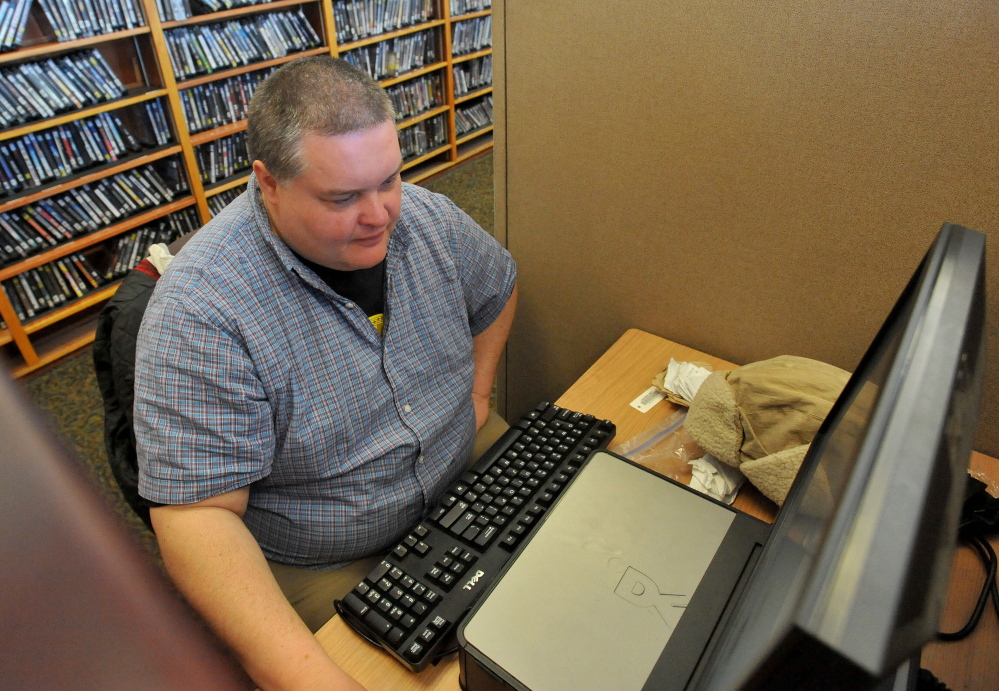At the New Vineyard Town Office, no one uses the Internet before 1 p.m. The computer sits unused by the window for the morning, while the town clerk makes do with a calculator, paper files and a large binder of yellowing records.
Later that afternoon, the town bookkeeper starts work and revs up the computer for any Web work needed for the day.
About 45 miles down the road, Augusta officials absentmindedly check smartphones, search Google for quick answers and process online bill pay submissions.
While some central Mainers have hardly made use of the Web, others say their lives have been rapidly transformed since the invention of the Web 25 years ago this week by Sir Tim Berners Lee.
The Web – not the same as the Internet – brought the six-year-old Internet from being a clunky, text-based resource that almost no one knew or cared about, and turned it into the fastest-growing communication tool ever.
The idea for the Web was first conceptualized in a March 12, 1989 paper by Lee, who wrote about a service (later the Web) that would be accessible to ordinary people to use the already existing set of rules (the Internet) that let computers connect with each other.
There are other services, such as email, that use the Internet but aren’t the Web, but general use of the Internet didn’t start to kick in until the invention of the Web and eventually early browsers like Mosaic.
Lee previously considered names such as Mine of Information, The Information Mine or The Mesh before settling on the World Wide Web. “None had quite the right ring,” he said Wednesday in a question and answer session.
Now, 87 percent of American adults use the Internet, according to an anniversary study by the Pew Research Center and three out of four Internet users in the study say it’s been a good thing for society.
And the more the Internet is woven into everyday life, the harder Americans say it would be to give up. More than half of Internet users say the technology would be difficult to give up, jumping up from 38 percent of users in 2006.
IN THE BEGINNING
Harry Fitzpatrick, a School Administrative District 49 board member, said 30 years after he first logged on he uses the Internet for “just about everything,” including banking, finding information and keeping in touch with loved ones via email.
Fitzpatrick, who graduated from Lawrence High School in 1967, said he used a forerunner of the Internet, called Arpanet, while he served in the Air Force, before it became available to the general public.
Even so, Fitzpatrick said he has grave concerns that have caused many of his peers to avoid the Web altogether.
He doesn’t like that corporations have access to all of an individual’s purchasing information, and can do whatever they want with it.
“The government and the NSA could learn a couple of things from Walmart and that lot,” he said.
Fitzpatrick said he is also discouraged by user interfaces that have become cluttered with advertisements, websites that force you to register in order to use them and increasingly difficult security and password requirements.
“It’s actually reaching the point in some cases where they’re making it too difficult to use,” he said.
“There may be a lot of people going back to paper.”
Educational technology has come a long way since the early days of the Web, said Regional School Unit 18 Superintendent Gary Smith, and now online learning is an integral part of school district classrooms.
Students use their computers to stream tutorials on YouTube, do research for homework and use the online classroom resource, Khan Academy.
Smith said the school has a five-year plan for increasing technology use, with hopes for a computing device, like a laptop or a iPad, for every child.
He said the online resources are used to supplement the learning that occurs in the classroom, but generally students still need formal guidance to learn while using the technology.
“Only the most discipline-directed students can do this well on their own,” Smith said. “Most need supplemental support from their school district for online learning.”
‘THE WORLD WE LIVE IN’
The Web has also benefited professional development, Smith said, and school faculty have audited online courses with Ivy League schools.
“It’s the reality of the world we live in. It is just going to be more and more the way that education happens,” he said.
Fitzpatrick, the SAD 49 board member, said no one should be surprised that people of retirement age are comfortable in a digital environment.
“You have to remember,” he said, “it’s my age group that invented this thing.”
Kaitlin Schroeder can be contacted 861-9252 or at:
kschroeder@centralmaine.com
Send questions/comments to the editors.



Success. Please wait for the page to reload. If the page does not reload within 5 seconds, please refresh the page.
Enter your email and password to access comments.
Hi, to comment on stories you must . This profile is in addition to your subscription and website login.
Already have a commenting profile? .
Invalid username/password.
Please check your email to confirm and complete your registration.
Only subscribers are eligible to post comments. Please subscribe or login first for digital access. Here’s why.
Use the form below to reset your password. When you've submitted your account email, we will send an email with a reset code.